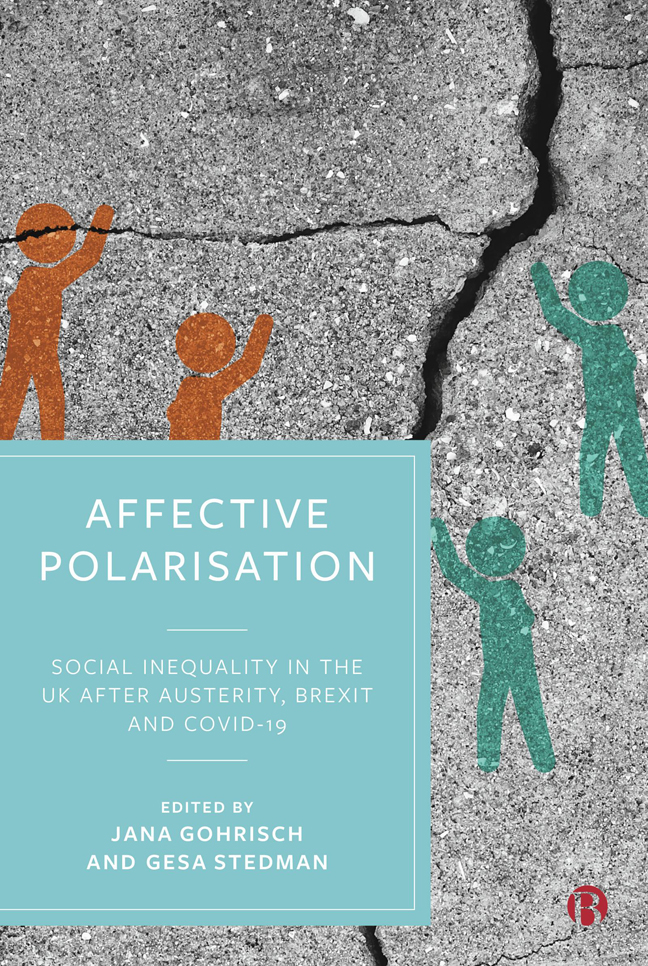Book contents
- Frontmatter
- Contents
- List of Figures, Tables and Boxes
- Notes on Contributors
- Acknowledgements
- Introduction
- 1 The Divided Left in the UK: Partisanship, Ideology and Class after Brexit
- 2 Populism and the People: Elitism, Authoritarianism and Libertarianism
- 3 ‘Coloring the Utterance with Some Kind of Perceivable Affect’: Constructing ‘Country’ and ‘People’ in Speeches by Theresa May and Boris Johnson – A Linguistic Perspective
- 4 The Challenges of Polarisation: Lessons for (Re-)Politicising Inequality across Four English Towns
- 5 “Go Away, But Don't Leave Us”: Affective Polarisation and the Precarisation of Romanian Essential Workers in the UK
- 6 Racialised Affective Polarisation in the UK
- 7 “Now You Have to Listen”: A Historical Analysis of Britain’s Left-Behind Communities
- 8 Britain in a State of Emergency: Studying Ken Loach's Films I, Daniel Blake (2016) and Sorry We Missed You (2019)
- 9 Cloaking Class: Making the Working Class Visible
- 10 Class, Poverty and Inequality in Scotland: Independence and the Creation of Affective Polarisations
- 11 Language and Identity: The Taliesin Tradition
- Conclusion
- Index
5 - “Go Away, But Don't Leave Us”: Affective Polarisation and the Precarisation of Romanian Essential Workers in the UK
Published online by Cambridge University Press: 23 January 2024
- Frontmatter
- Contents
- List of Figures, Tables and Boxes
- Notes on Contributors
- Acknowledgements
- Introduction
- 1 The Divided Left in the UK: Partisanship, Ideology and Class after Brexit
- 2 Populism and the People: Elitism, Authoritarianism and Libertarianism
- 3 ‘Coloring the Utterance with Some Kind of Perceivable Affect’: Constructing ‘Country’ and ‘People’ in Speeches by Theresa May and Boris Johnson – A Linguistic Perspective
- 4 The Challenges of Polarisation: Lessons for (Re-)Politicising Inequality across Four English Towns
- 5 “Go Away, But Don't Leave Us”: Affective Polarisation and the Precarisation of Romanian Essential Workers in the UK
- 6 Racialised Affective Polarisation in the UK
- 7 “Now You Have to Listen”: A Historical Analysis of Britain’s Left-Behind Communities
- 8 Britain in a State of Emergency: Studying Ken Loach's Films I, Daniel Blake (2016) and Sorry We Missed You (2019)
- 9 Cloaking Class: Making the Working Class Visible
- 10 Class, Poverty and Inequality in Scotland: Independence and the Creation of Affective Polarisations
- 11 Language and Identity: The Taliesin Tradition
- Conclusion
- Index
Summary
Introduction
The UK has always been a country that, much like all developed economies, has relied on a migrant workforce for its economic prosperity. This element of global capitalism goes back centuries and is riddled with exploitation and injustice, which has endured until today. In very broad strokes, the pattern speaks of an economic system that is happy to allow people from less economically developed countries to enter the UK and work towards its growth for sub-par pay and benefits as long as it can ensure that the very same people remain outsiders with fewer benefits and protections than the White UK-born population. One need look no further back than the 2018 Windrush scandal to see that the present injustices and inequalities are still enduring (Gentleman, 2020; The Guardian, 2021).
Since joining the EU in 2007, Romanian and Bulgarian workers have also become part of this history of exploitation in the UK. They have gained notoriety as a population perceived as corrupt, as criminals and ‘benefit scroungers’, as diseased and dangerous for the local population. Vilified in the media, treated as second-class citizens (The Migration Observatory, 2014; McGrath, 2019), they are nevertheless crucial to the British economy, particularly due to the countless so-called ‘low-skilled’ but essential jobs that they do: care work, factory work, maintenance and cleaning, or work in agriculture and the food industry (GLAA, 2020).
This contradictory status was highlighted with painful clarity in the wake of the first COVID-19 lockdown restrictions. Migrant seasonal agricultural workers were initially forced to return to Romania, leaving British crops unpicked in the fields and British farmers in a critical situation (Harvey, 2020). Employers and even the government went to great lengths to try and offset this imbalance by recruiting British workers, many of whom had been furloughed, to work at picking the crops. Nevertheless, British authorities and employers soon discovered that British workers were unwilling to do the backbreaking work that agriculture entailed and especially for the low pay that was being offered.
- Type
- Chapter
- Information
- Affective PolarisationSocial Inequality in the UK after Austerity, Brexit and COVID-19, pp. 110 - 124Publisher: Bristol University PressPrint publication year: 2023



